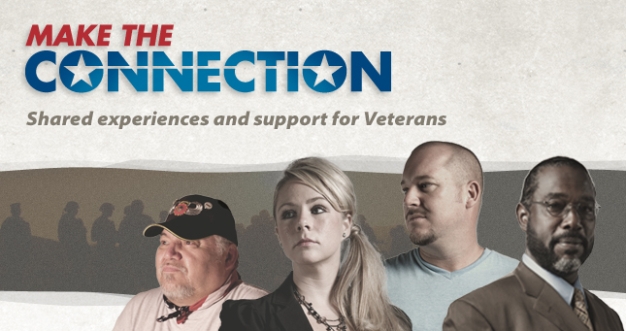It was strange to find myself without a battle buddy after I got out of the Army. The first and probably most important thing ingrained in all of us at infantry school was this: Always have someone there to back you up, whether it be in on a battlefield or a dark street in Seattle. I could always count on my friends, and they knew I had their backs. But when we left the service and went back to our civilian lives all over the country, that close support system vaporized. We still kept up, but it wasn’t the same as sitting on your buddy’s cot after a patrol, telling jokes and daydreaming about going home.
Going back to civilian life can be difficult for that very reason—support just doesn’t seem available, and pretty soon, you might feel it’s because you’re the only one with adjustment problems. So in an effort to battle that disconnect, VA has launched Make the Connection—a campaign that allows Veterans of all eras and experiences to not only learn more about resources and conditions they may have, but listen to the stories of other Vets who served alongside them.
The connection starts with an information field that filters to your specific needs. The selections account for gender, service branch, service era, and combat exposure. There are even different resources pages for Veterans, National Guard or Reserve, families, active duty folks, and clinicians.
Navigating the tabs
There are a few tabs with information, so here’s a handy breakdown:
Life events and experiences: From reintegration to the death of family or friends, ways to cope with events in our lives
Stories of connection: Video interviews with Veterans about their experiences in war and the challenges back home. The videos can be filtered by gender, era and combat exposure
Signs and symptoms: Helps identify common ailments that affect Veterans, along with their associated conditions
Conditions: Post-traumatic stress, TBI, suicide and other issues are associated with traumatic experiences. Learn their symptoms, signs and where to get help
Resources and support: It’s time to find the support you need. Take a self-assessment test and punch in your ZIP code and find VA resources and programs in your area. You can also search the National Resource Directory for information on benefits and compensation, employment, housing and more.
It takes just one deployment to go to war, but a lifetime to come home. It’s never been easy and never will be. But there are ways to receive help if you know where to look. Poke around Make the Connection and let us know if it helped you.
Topics in this story
More Stories
Summer Sports Clinic is a rehabilitative and educational sporting event for eligible Veterans with a range of disabilities.
Report examines the input of over 7,000 women Veterans: They are happier with VA health care than ever before.
Veterans and caregivers, you can help shape the future eligibility requirements for the VA Caregiver Support program.








I am a producer with the national TV show America Now. We are looking for someone in the Charlotte, NC, region who would be willing to be interviewed about their experience coping with PTSD. If you are interested, email me at jrivenbark@raycommedia.com. Thanks!
Why can’t the va process ojt apprenticeship paper work in a timely manner still waiting for september and october and no help and no reply from the va
Alex, there is sound at U tube.
Alex, Where’s the volume? I got no sound from the video’s.